At the Mujeres Market, women, queer and trans people of color find a safe space to sell their products
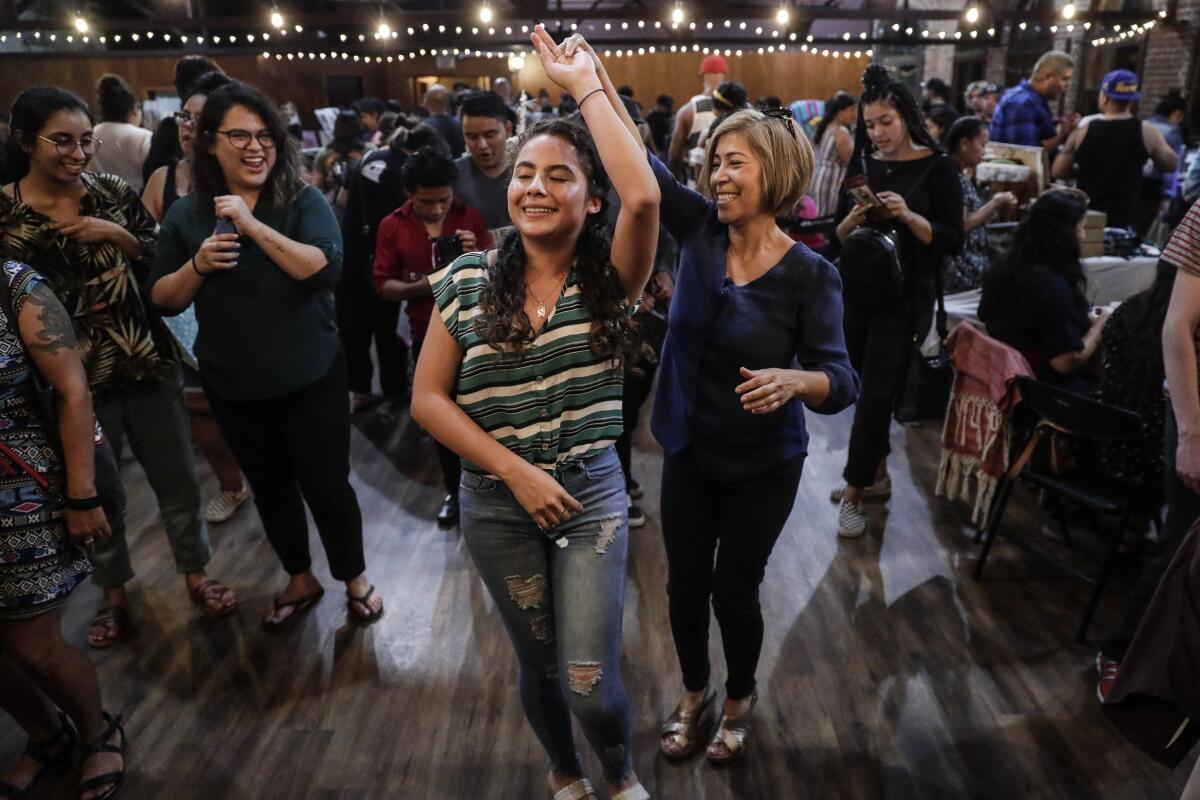
- Share via
There are still 15 minutes until the official 6 p.m. start of Mujeres Market, but the brick and wood banquet hall of Riverside’s Life Arts Center is already humming. Vendors snap Instagram-ready photos of tables displaying reiki-infused essential oils and vibrant painting of roosters wearing glasses. Others prepare free samples of the Peruvian condiment aji verde and trail mix coated in tangy chamoy. An instrumental cumbia version of Drake’s “Hotline Bling” plays overhead.
The temperature on this Thursday in early September has almost cracked 100 degrees, and even with sunset approaching, outside it’s still in the 90s. Gloria Lucas, the 28-year-old founder and chief executive of Mujeres Market, explains that when she brings the traveling event to Riverside, it’s usually held in the building’s basement. The space is bigger, but there’s no air conditioning down there. So today they moved everything to the climate-controlled Florence room, which normally hosts weddings and quinceañeras.
Lucas is setting up her own tables for Nalgona Positivity Pride, the Xicana body-positivity group she created and out of which Mujeres Market grew. She carefully folds T-shirts emblazoned with messages like “My Body Is a Decolonial Act of Resistance Against Patriarchy” and “Ancestors Guide Me.”
Nalgona is slang for a woman with a large rear end; it’s often used as a leering appraisal or to chide someone for putting on weight. “That term, if it’s positive, it’s usually within that context of objectification,” Lucas explains. “But I use it as a way of saying our bodies [are] taking up as much space as possible and being unapologetic about it. There are some folks who say, ‘Well, I don’t have a big butt.’ And I say, ‘Well, we all have a big butt in our hearts, and that’s what matters.’”
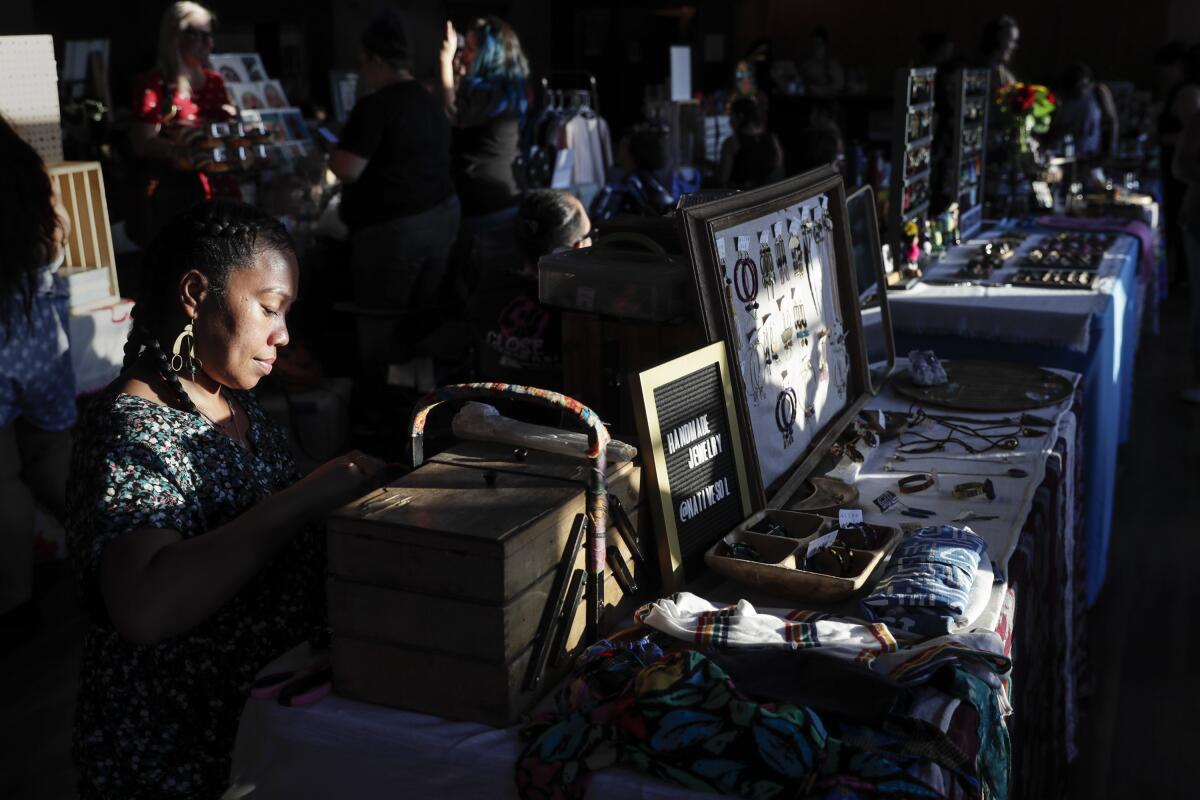
Back in the summer of 2017, Nalgona Positivity Pride brought together a group of entrepreneurs who were all women of color. Together they discussed one of the main problems they had: finding fruitful vending opportunities. In response, Lucas established Mujeres Market as a place where individuals who identify as women of color, femmes of color, or queer or trans people of color can sell their homemade or independently created products.
The first event was held that July at the Eastside Café, a cultural center in El Sereno, and included more than 40 vendors. Mujeres Market has subsequently had 28 installments across Southern California, plus a pop-up in Albuquerque this summer. In June, the biggest Mujeres Market yet took place at the Rio Hondo Event Center in Downey, with over 80 vendors attracting several thousand people. The crowd was so large that afterward the event’s organizers had to pay to get the carpets cleaned.
Mujeres Markets are now mostly collaborations with other events, such as the Hollywood Farmers Market. The Riverside sessions are tied to the city’s monthly arts walk.
As the Life Arts space begins to fill up with curious customers, Kat Rivera of Boss Annie Crystals buzzes around her table. Pyrite from Colorado, thundereggs from Oregon and black tourmaline from Mexico are piled in the upturned lids of cardboard document boxes. Rivera is based in the San Fernando Valley but sources many of her gems and rocks through Native American people in reservations or in vacation towns around the American Southwest. Other pieces come from as far away as China and Madagascar.
Beyond the private clients for whom she tracks down special items, Rivera sells only at markets and wellness events. This lack of overhead means she can offer her goods at less than the usual going price. This is her fourth Mujeres Market in Riverside. “L.A. is oversaturated with gems and crystal dealers, and I have my place in it too, but Riverside is a cool community,” she says. “If I make my gas money back, I’m happy.”
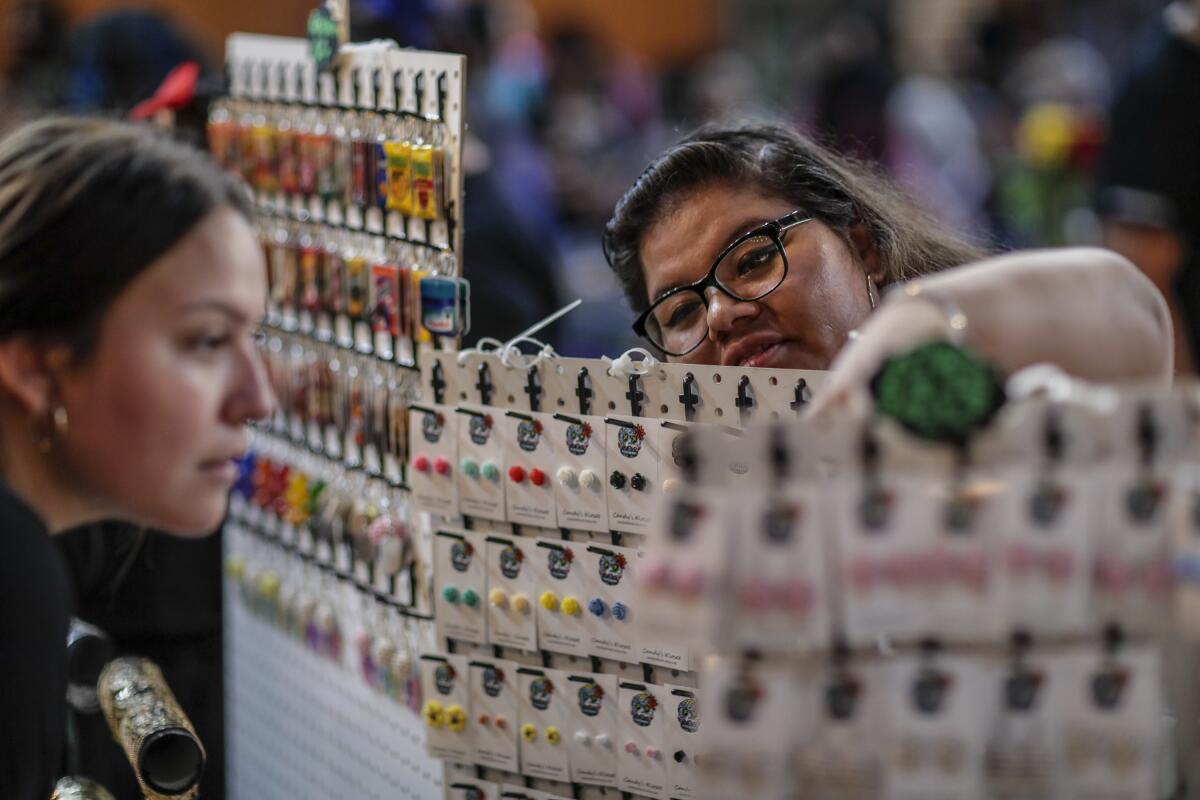
For each Mujeres Market, prospective vendors must fill out an extensive application, which is reviewed by Lucas and Monica Virgen Zamora, the 27-year-old chief operations officer. Would-be vendors also must agree to not sell fat-phobic products, items that promise weight loss, and sage, palo santo, dream catchers or other items that have spurred concerns over cultural appropriation. Lucas and Zamora also dig through each applicant’s social media accounts to see what type of material they post, to make sure there isn’t a conflict.
Though this process helps them eliminate vendors who aren’t on their wavelength, they can’t apply that same filter to customers, who may not have this same level of cultural awareness. “We created [Mujeres Market] as a way for all of us to help one another and to be self-reliant. And so we let people know that that’s why these spaces exist,” Lucas said by phone a week before the market. “I think outsiders understand that for the most part and are willing to be open.”
“My therapist is a very nice white Jewish lady, and she always wants to come,” Zamora added. “She genuinely wants to help and understand, and wants to shop with intention.”
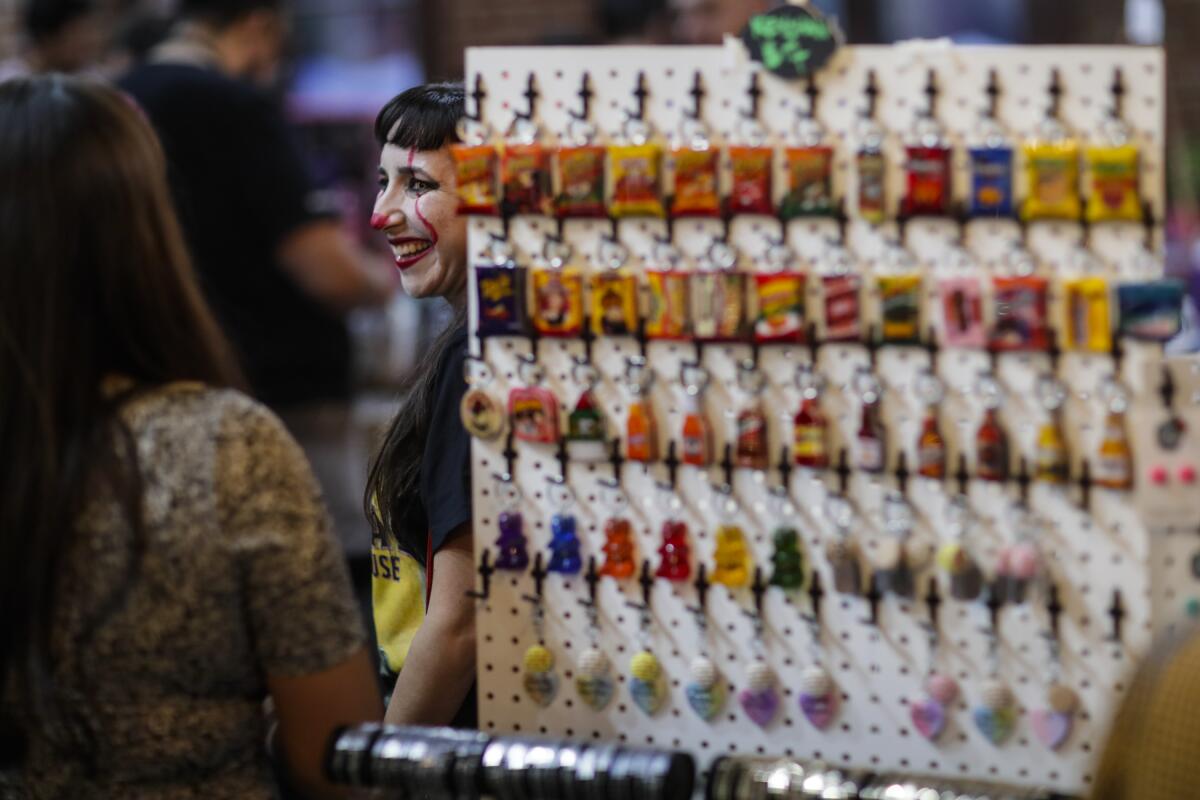
Veteran Mujeres Market vendors describe what they’ve become a part of with terms of escalating endearment. It’s a network. It’s a community. It’s a family, they say. The word “empowerment” is used a lot in these conversations, but that doesn’t make the sentiment behind it any less true.
Dora Lopez Mata of Ontario’s Dora’s Tiendita explains that when she was in graduate school five years ago, she was stressed out by all the work and how she was going to pay for her education, so her partner recommended she take up some form of art to relax. She taught herself to make earrings and soon began selling dangly pieces adorned with images like raised fists and sunflowers. She was part of the second Mujeres Market, and this Riverside event marks her seventh appearance.
Because Mata’s products have shown up on the Mujeres Market social media accounts, she gets invited to sell at other markets around the region. She estimates she’s done 25 events. “[Jewelry making] was something that was just to take care of myself, and now it has become something to sustain me financially,” she says.
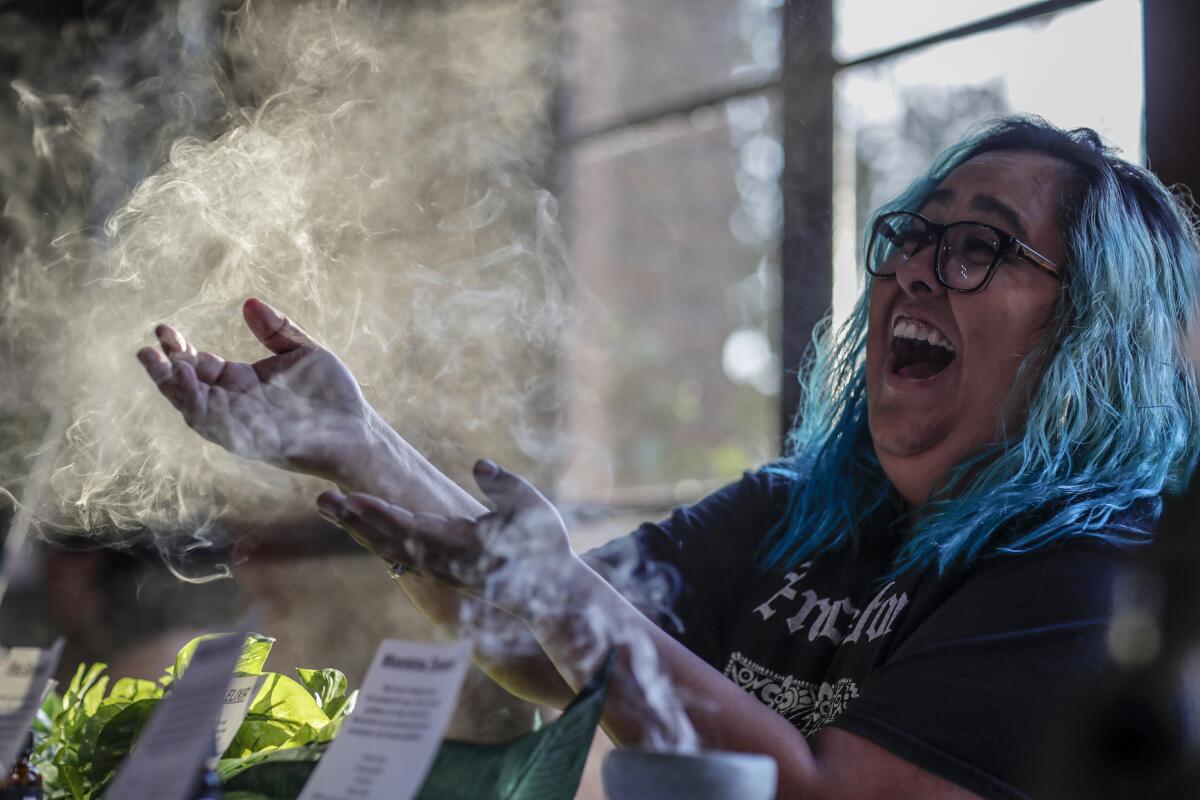
As the night nears its end around 9, Melissa Martinez at Vegancitas is down to just three of her vegan vanilla conchas, their swirled pink, purple and green tops radiating from inside her small pastry case. Jennifer Picos of J’s Trail Mex, who drove for six and a half hours from Gilbert, Ariz., is almost sold out too.
Lucas is already thinking about her bed about 40 miles away in Irvine, but she feels good about how things went and about how many of her friends from when she lived in this city as a teenager and into her early 20s came by. “Riverside has always supported me,” she says.
More to Read
Sign up for The Wild
We’ll help you find the best places to hike, bike and run, as well as the perfect silent spots for meditation and yoga.
You may occasionally receive promotional content from the Los Angeles Times.










